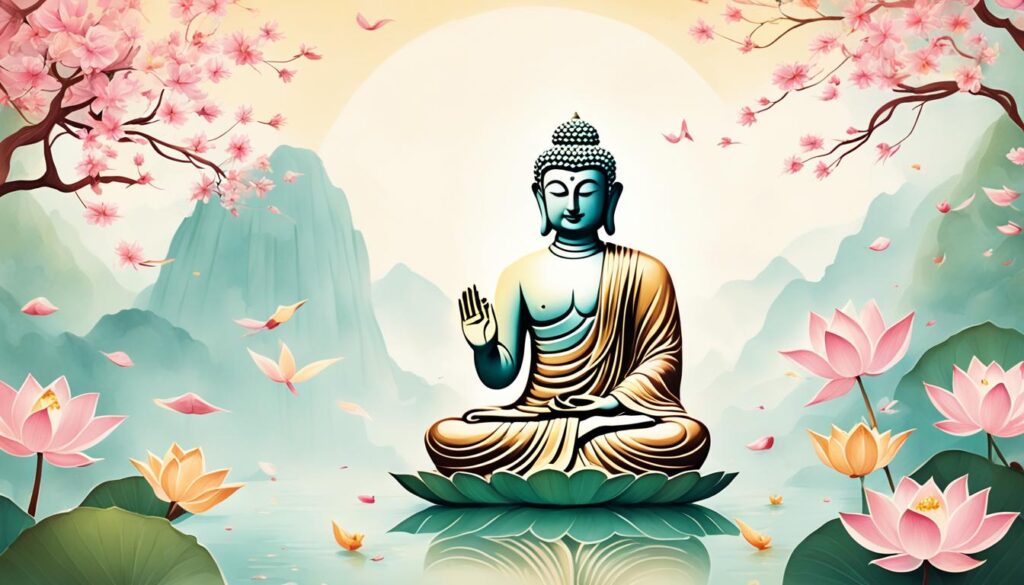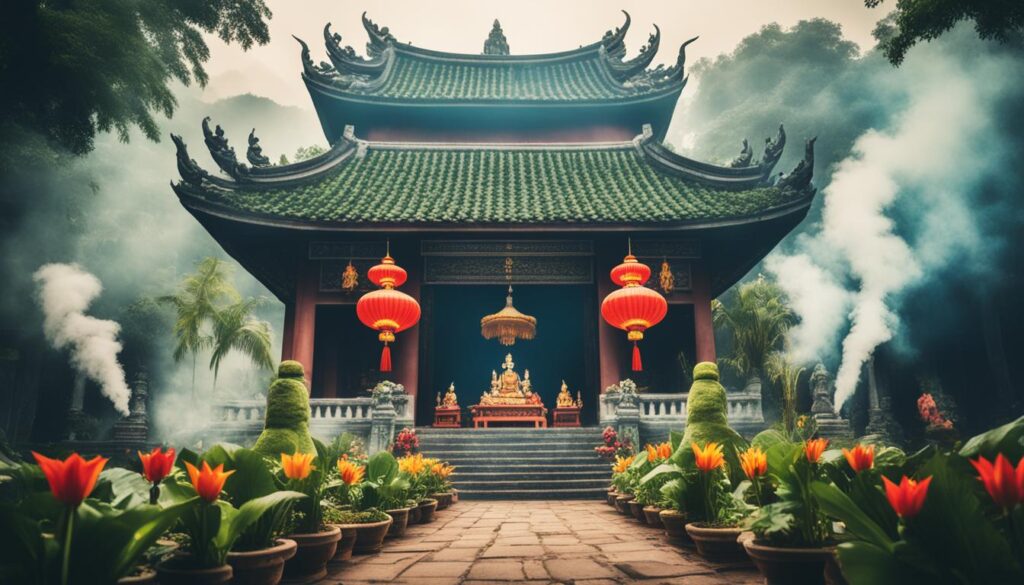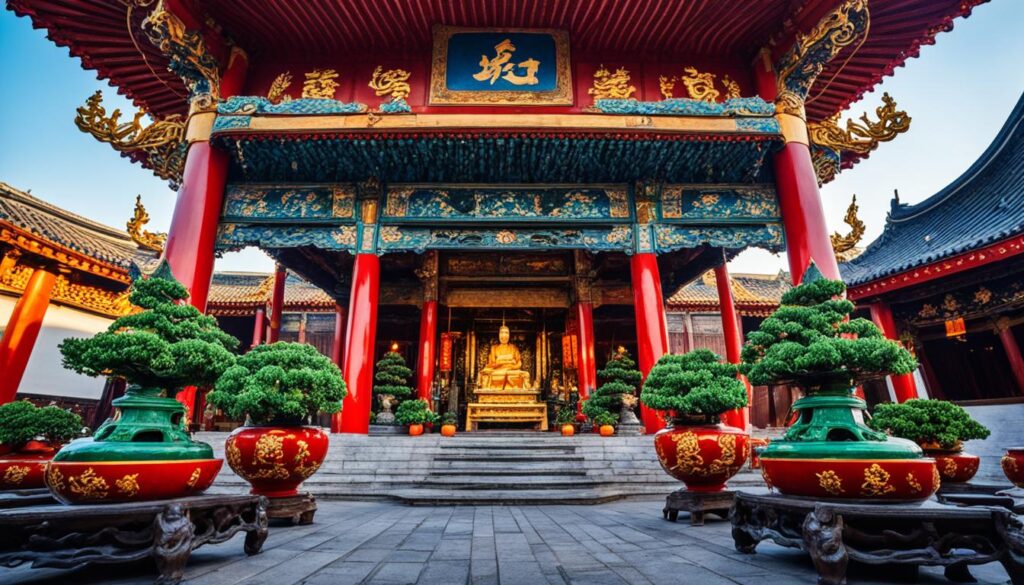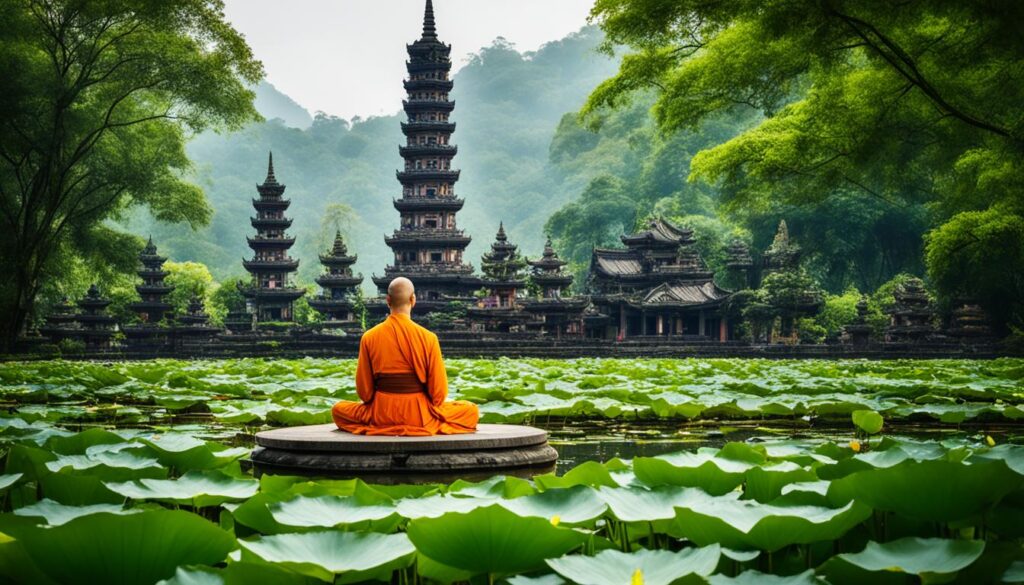Have you ever wondered how a spiritual practice can become deeply rooted in a culture, permeating every aspect of daily life? Vietnamese Buddhism is a prime example of this phenomenon. It goes beyond mere rituals and beliefs, shaping festivals, holidays, and the very essence of Vietnamese culture. Delve into the teachings, practices, and traditions of Vietnamese Buddhism and discover how it fosters serenity and compassion in the hearts of its followers.
Key Takeaways:
- Vietnamese Buddhism is an integral part of Vietnamese culture, influencing festivals, holidays, and everyday customs.
- Tet Nguyen Dan, the Lunar New Year, exemplifies the harmonious relationship between Buddhism and Vietnamese culture.
- Vesak, the celebration of Buddha’s birthday, showcases the core values of compassion, mindfulness, and peace.
- Ancestors’ Day highlights the blending of Buddhism and ancestral worship, emphasizing gratitude, mindfulness, and family unity.
- The Jade Emperor Pagoda in Ho Chi Minh City stands as a testament to the enduring influence of Vietnamese Buddhism.
The Significance of Tet Nguyen Dan (Lunar New Year)
Tet Nguyen Dan, also known as the Lunar New Year, is an auspicious occasion celebrated with great enthusiasm and reverence by the Vietnamese Buddhist community. This major holiday holds immense cultural and spiritual significance, reflecting the profound influence of Vietnamese Buddhism on the lives of its people.
During Tet, families and individuals embark on a sacred journey to Vietnamese Buddhist temples and pagodas, seeking solace, renewal, and blessing as they usher in the new year. These tranquil places of worship serve as a sanctuary for reflection and gratitude, as visitors offer prayers and express gratitude for the past year’s blessings while setting intentions for the year ahead.
Vegetarianism plays a paramount role during Tet, as it symbolizes compassion and non-harm. Vietnamese Buddhists embrace a vegetarian diet during this festive period, honoring the Buddhist principle of ahimsa and demonstrating their commitment to love and kindness towards all sentient beings.
The vibrant and colorful festivities during Tet are adorned with symbolic lanterns, illuminating the night sky and representing enlightenment. These radiant lanterns exemplify the core teachings of Buddhism, guiding individuals towards spiritual growth, wisdom, and a journey towards enlightenment.
Tet Nguyen Dan provides a unique lens through which we can witness the harmonious relationship between Buddhism and Vietnamese culture. It beautifully showcases the profound impact of Vietnamese Buddhism on the daily lives, rituals, and traditions of the Vietnamese Buddhist community.
Celebrating Vesak (Buddha’s Birthday)
Vesak, the celebration of Buddha’s birthday, holds profound significance in Vietnamese Buddhism. This sacred day is honored with vibrant processions, serene candlelit offerings, and the compassionate release of animals. It serves as a beautiful embodiment of the core teachings of Vietnamese Buddhism, emphasizing compassion, mindfulness, and peace.
During Vesak, Buddha statues in Vietnam hold a special place of reverence, symbolizing the guiding light of enlightenment. They serve as focal points for reflection and a reminder of the profound wisdom and teachings of Buddhism. Vesak is a time when devotees vividly celebrate and bring to life the transformative power of compassion, mindfulness, and peace.
The Essence of Vesak
- The celebration of Buddha’s birthday
- Marked by processions, candlelit offerings, and the release of animals
- Embodying compassion, mindfulness, and peace
- Significance of Buddha statues in Vietnam
- Serving as focal points for reflection and reverence
Through the celebration of Vesak, Vietnamese Buddhist teachings and culture come alive, reminding individuals of the importance of compassion, mindfulness, and peace in their daily lives. It is a time to reflect on the profound impact Buddhism has on personal growth and societal harmony.

The image above captures the beauty and serenity of Vesak, illuminating the devotion and reverence shown during this sacred celebration. With each candle-lit offering and every step taken in the procession, Vietnamese Buddhists embody the teachings of Vesak, fostering unity, compassion, and inner peace in their lives and communities.
Ancestors’ Day and the Blending of Buddhism and Ancestral Worship
Ancestors’ Day holds a special place in Vietnamese culture, embodying the harmonious convergence of Buddhism and ancestral worship. This significant day provides an opportunity for families to gather and pay homage to their ancestors, while also integrating Buddhist rituals and teachings.
During Ancestors’ Day, Vietnamese families visit pagodas, temples, and ancestral altars to offer prayers and express gratitude to their ancestors. It is a time of deep reflection on lineage and the values passed down through generations. This practice of ancestral worship is a beautiful expression of reverence for the past and an acknowledgment of the interconnectedness of family ties.
Within the context of Vietnamese Buddhism, Ancestors’ Day represents unity and the blending of religious and cultural values. The fusion of ancestor worship with Buddhist rituals showcases the coexistence of these beliefs, highlighting the inclusive nature of Vietnamese Buddhism.
Ancestors’ Day emphasizes the importance of gratitude, mindfulness, and family unity, which are core tenets of Buddhist teachings. This celebration allows individuals to cultivate a sense of reverence for their ancestors while deepening their understanding of Buddhist principles.
The Significance of Ancestors’ Day in Vietnam
Ancestors’ Day, also known as Tết Trung Nguyên, is observed on the fifteenth day of the seventh lunar month in the Vietnamese calendar. It is believed that during this time, the gates of hell are open, allowing spirits of the deceased to return to the earthly realm. Vietnamese families take part in various rituals and practices to honor their ancestors and ensure their well-being in the afterlife.
One of the key customs during Ancestors’ Day is the preparation of elaborate altars with offerings such as fruits, flowers, and traditional dishes. These offerings symbolize respect, abundance, and sustenance for the ancestors. Incense sticks are also burned as a means of communication with the spiritual realm.

Ancestors’ Day Rituals and Practices
During Ancestors’ Day, Vietnamese families engage in several rituals and practices to honor their ancestors and express their gratitude.
- Visiting pagodas and temples: Families visit sacred places to offer prayers and seek blessings for their ancestors’ souls. Pagodas and temples play a vital role during Ancestors’ Day, providing a serene setting for reflection and spiritual connection.
- Burning joss paper: It is customary to burn joss paper, also known as “ghost money,” to provide material wealth and comfort for the ancestors in the afterlife. The belief is that the smoke from the burning joss paper carries these blessings to the spirits.
- Lighting incense: Lighting incense serves as a symbol of purification and spiritual devotion. The fragrant smoke represents the connection between the earthly and spiritual realms, guiding the ancestors’ souls to their living descendants.
- Preparing ancestral altars: Families meticulously arrange altars with photographs or portraits of their ancestors, along with offerings of food and drinks. This act represents the connection between the present and the past, keeping the memory of ancestors alive.
Ancestors’ Day and Buddhist Teachings
The convergence of Buddhism and ancestral worship on Ancestors’ Day reflects the values and teachings of Vietnamese Buddhism. Buddhism emphasizes the practice of mindfulness, compassion, and gratitude, which are mirrored in the rituals and customs of Ancestors’ Day.
By integrating Buddhist teachings into this traditional celebration, Vietnamese Buddhists pay tribute to their ancestors while upholding the principles of non-attachment, impermanence, and interconnectedness. This blending of ancestral worship and Buddhism serves as a reminder of the timeless wisdom and relevance of Buddhist teachings in daily life.
Through Ancestors’ Day, Vietnamese Buddhists honor their heritage, express their gratitude, and deepen their spiritual connection with both the past and the present. This celebration showcases the harmonious coexistence of religious and cultural values in Vietnam, providing a source of inspiration and unity for generations to come.
Exploring the Jade Emperor Pagoda in Ho Chi Minh City
The Jade Emperor Pagoda, located in the vibrant city of Ho Chi Minh, is a magnificent example of Vietnamese Buddhist architecture and spirituality. This pagoda, also known as Ngoc Hoang Pagoda, is a must-visit destination for those seeking to immerse themselves in the rich heritage of Vietnamese Buddhism.
The Jade Emperor Pagoda stands as a testament to the enduring influence of Vietnamese Buddhism. Its intricately carved exterior tells captivating stories from Buddhist mythology, inviting visitors to embark on a spiritual journey as they explore its sacred halls. Each detail of the pagoda reflects the devotion and skill of the craftsmen who constructed it.
At the heart of the Jade Emperor Pagoda, a stunning gold Buddha statue takes center stage. This majestic figure embodies the guiding principles of Vietnamese Buddhist teachings, symbolizing peace, wisdom, and enlightenment. Its radiant presence creates a sacred ambiance, inspiring visitors to seek inner serenity.

A visit to the Jade Emperor Pagoda grants you a glimpse into the deep-rooted traditions and beliefs that have shaped Vietnamese Buddhist culture. The pagoda’s serene atmosphere encourages introspection and offers a peaceful respite from the bustling city outside. As you explore the pagoda’s intricacies, you’ll gain a profound appreciation for the profound influence of Vietnamese Buddhism on the local community.
Opening Hours
| Day | Opening Hours |
|---|---|
| Monday | 8:00 AM – 5:00 PM |
| Tuesday | 8:00 AM – 5:00 PM |
| Wednesday | 8:00 AM – 5:00 PM |
| Thursday | 8:00 AM – 5:00 PM |
| Friday | 8:00 AM – 5:00 PM |
| Saturday | 8:00 AM – 5:00 PM |
| Sunday | 8:00 AM – 5:00 PM |
Visiting the Jade Emperor Pagoda is an opportunity to witness the harmonious blend of art, spirituality, and cultural heritage. It’s a place where the teachings of Vietnamese Buddhism come alive, inspiring visitors to embrace serenity, wisdom, and compassion.
Buddhism’s Impact on Personal and Societal Harmony
Vietnamese Buddhism offers valuable insights for personal and societal harmony. The teachings of mindfulness, compassion, and non-harm form the foundation for cultivating inner peace and fostering positive relationships. By incorporating Buddhist principles into your daily life, you can enhance your well-being and contribute to a more harmonious society.
At the core of Vietnamese Buddhist teachings is mindfulness, the practice of being fully present and aware in each moment. This practice allows you to cultivate a deep sense of self-awareness, leading to a greater understanding of your thoughts, emotions, and actions. By developing mindfulness, you can better manage stress, reduce negative emotions, and improve your overall mental well-being.
Compassion is another key aspect of Vietnamese Buddhist teachings. It involves empathizing with the suffering of others and taking action to alleviate it. By cultivating compassion, you can build stronger connections with others, foster empathy and understanding, and contribute to a more compassionate society.
The principle of non-harm, known as ahimsa, is integral to Vietnamese Buddhist culture. It encourages living in a way that minimizes harm to oneself, others, and the environment. By practicing non-harm, you can promote peace and harmony in your interactions with others, as well as preserve and protect the world around you.
Vietnamese Buddhist culture embodies these teachings of mindfulness, compassion, and non-harm. It places great emphasis on gratitude, compassion, and family unity, serving as a guiding light for a peaceful existence. By embracing Vietnamese Buddhist teachings, you can not only enhance your own well-being but also contribute to the harmony and well-being of the larger society.
Benefits of Embracing Vietnamese Buddhist Teachings:
- Enhanced self-awareness and mindfulness
- Improved mental well-being and stress management
- Stronger connections and empathy with others
- Contribution to a more compassionate society
- Promotion of peace and harmony in relationships
- Preservation and protection of the environment

| Key Teachings of Vietnamese Buddhism | |
|---|---|
| Teaching | Description |
| Mindfulness | Practice of being fully present and aware in each moment, cultivating self-awareness and reducing stress. |
| Compassion | Empathy for the suffering of others and taking action to alleviate it, fostering stronger connections and empathy. |
| Non-harm | Living in a way that minimizes harm to oneself, others, and the environment, promoting peace and harmony. |
Conclusion
Vietnamese Buddhism is an intricate tapestry woven into the very essence of Vietnamese culture and society. Its teachings and traditions have left an indelible mark on festivals, holidays, and the daily lives of the Vietnamese people. By immersing yourself in the major Buddhist holidays, such as Tet Nguyen Dan and Vesak, and by delving into the harmonious fusion of Buddhism and ancestral worship, you can unveil the profound richness of Vietnamese Buddhist culture.
The Jade Emperor Pagoda stands as a breathtaking testament to the artistry and spiritual significance entrenched within Vietnamese Buddhism. Its intricately carved structure bears witness to the deep history of Vietnamese Buddhism, serving as a sacred space for devotees to seek solace and enlightenment.
Embracing Vietnamese Buddhism offers a transformational journey towards serenity, compassion, and personal growth. Through the guidance of Vietnamese Buddhist traditions, you can cultivate mindfulness, deepen your understanding of compassion, and awaken to the interconnectedness of all beings. By embracing this ancient and vibrant spiritual path, you open yourself to a world of inner peace and harmony, while also contributing to the collective well-being of society.
FAQ
What is Vietnamese Buddhism?
Vietnamese Buddhism is a religious and cultural practice deeply rooted in Vietnamese society. It encompasses spiritual beliefs, teachings, and traditions that have influenced festivals, holidays, and daily life in Vietnam.
What are some Vietnamese Buddhist practices?
Vietnamese Buddhist practices include mindfulness meditation, chanting, offering prayers and incense at pagodas, vegetarianism, and engaging in acts of compassion and kindness.
How does Tet Nguyen Dan (Lunar New Year) relate to Vietnamese Buddhism?
Tet Nguyen Dan is a major holiday in Vietnam that exemplifies the influence of Vietnamese Buddhism. During Tet, people visit pagodas to offer prayers, reflect on the past year, practice vegetarianism, and adorn the festival with symbolic lanterns representing enlightenment.
What is the significance of Vesak in Vietnamese Buddhism?
Vesak is the celebration of Buddha’s birthday and is a significant event in Vietnamese Buddhism. It is marked by processions, candlelit offerings, and the release of animals, all embodying compassion and mindfulness. Buddha statues hold special significance during Vesak, serving as focal points for reflection and reverence.
How does Ancestors’ Day blend Buddhism and ancestral worship?
Ancestors’ Day is a significant day in Vietnamese culture that incorporates both Buddhism and ancestral worship. Families visit pagodas to offer prayers and reflect on lineage, highlighting the harmonious coexistence of religious and cultural values in Vietnam.
What is the Jade Emperor Pagoda and its significance in Vietnamese Buddhism?
The Jade Emperor Pagoda in Ho Chi Minh City is a remarkable example of Vietnamese Buddhist architecture and spirituality. It features intricate carvings depicting Buddhist mythology and houses a gold Buddha statue that represents peace and enlightenment.
How does Vietnamese Buddhism promote personal and societal harmony?
Vietnamese Buddhism teaches mindfulness, compassion, and non-harm as central values. By incorporating these principles into daily life, individuals can enhance their well-being and contribute to a more harmonious society.
What is the overall impact of Vietnamese Buddhism on Vietnamese culture?
Vietnamese Buddhism has deeply influenced festivals, holidays, and daily life in Vietnam. Its teachings and traditions, such as Tet Nguyen Dan and Vesak, as well as the blending of Buddhism and ancestral worship, reflect the rich and integral role of Vietnamese Buddhism in Vietnamese culture and society.

